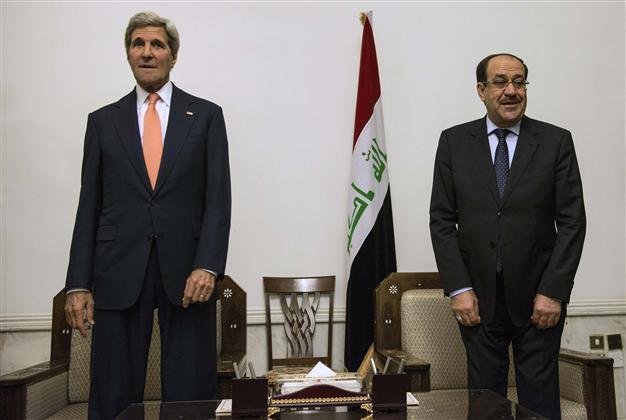Kerry backs Iraq against 'existential' militant threat
BAGHDAD - Agence France-Presse

Iraqi PM al-Maliki and U.S. Secretary of State Kerry meet at the Prime Minister's Office in Baghdad, June 23. REUTERS Photo
U.S. Secretary of State John Kerry on June 23 pledged "intense" support for Iraq against the "existential threat" of a major militant offensive pushing toward Baghdad from the north and west.Flying in from Jordan, Kerry met with Prime Minister Nuri al-Maliki and other Iraqi leaders to urge a speeding up of the government formation process in order to face down the insurgents.
The United States' "support will be intense, sustained, and if Iraq's leaders take the steps needed to bring the country together, it will be effective," Kerry told journalists in Baghdad.
But the danger to Iraq, he said, is dire. "It is a moment of decision for Iraq's leaders," Kerry said. "Iraq faces an existential threat and Iraq's leaders have to meet that threat."
During their talks, Maliki also emphasised the danger of the crisis, telling Kerry it "represents a threat not only to Iraq but to regional and international peace," his office said.
Iraqi security forces are struggling to hold their ground in the face of an insurgent onslaught that has seized major areas of five provinces, displaced hundreds of thousands of people and sparked fears the country could be torn apart.
Maliki's security spokesman said Monday "hundreds" of soldiers had been killed since the insurgents, led by the powerful jihadist Islamic State of Iraq and the Levant (ISIL), launched their offensive on June 9.
The announcement on television by Lieutenant General Qassem Atta is the most specific information provided so far by the government on losses sustained by the security forces.
The militants are continuing their charge, overrunning the Al-Waleed border crossing with Syria, officers said on June 23.
The capture of the post means all official crossings with Iraq's neighbour to the west are outside government control, and increases the militants' ability to bring men and materiel across the border from Syria.
ISIL aims to create an Islamic state incorporating both Iraq and Syria, where the group has become a major force in the rebellion against President Bashar al-Assad. Washington wants Arab states to bring pressure on Iraq's leaders to speed up government formation, which has made little headway since April elections, and has tried to convince them ISIL poses as much of a threat to them as to Iraq.
Kerry warned all countries, particularly in the Gulf, that "there is no safety margin whatsoever in funding a group like ISIL." The group has commandeered an enormous quantity of cash and resources as a result of the advance, bolstering coffers that were already the envy of militant groups around the world.
U.S. leaders have stopped short of calling for Maliki to step down, but there is little doubt that they feel he has squandered the opportunity to rebuild Iraq since U.S. troops withdrew in 2011.
"The United States would like to see the Iraqi people find leadership that is prepared to represent all of the people of Iraq," Kerry told reporters in Cairo on June 22.
A top U.S. official who has been on the ground in Iraq told reporters that there was "a lot of anxiety and a lot of looking to the U.S. for help."
U.S. President Barack Obama has offered to send up to 300 military advisers to Iraq, but has so far not backed air strikes as requested by Baghdad.
















